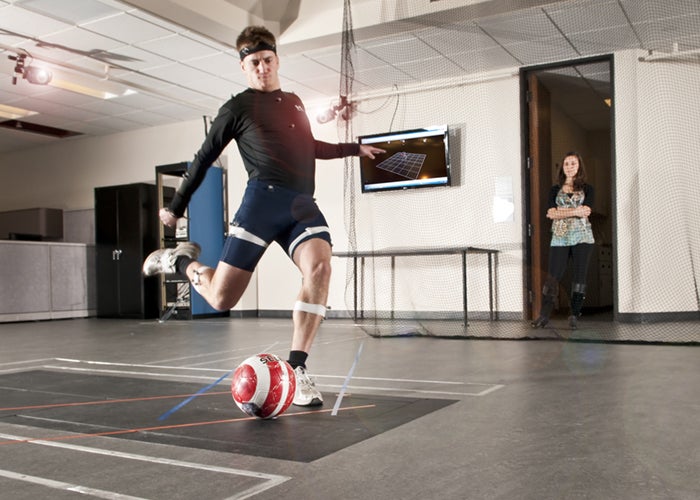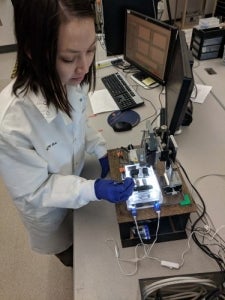
Boise State University is launching a new doctoral program in biomedical engineering, the first of its kind in Idaho. The transdisciplinary program was approved by the Idaho State Board of Education in December 2018 and will officially begin fall semester of 2019.
Biomedical engineering is the application of engineering concepts to medicine and biology. This relatively new field has transformed the healthcare industry by advancing the understanding of the human body and by developing life-changing medical technologies, including prosthetic limbs, artificial knees and hips, pacemakers and stents.
“This program will integrate biomedical researchers across Boise State’s campus to provide students with the technical and professional skills to lead interdisciplinary teams and invent new medical technologies and therapies,” said Trevor Lujan, an associate professor in mechanical engineering and director of the new doctoral program.

The program was developed as a collaboration between Boise State’s College of Health Sciences, College of Engineering, College of Arts and Sciences and Graduate College. Students will have the opportunity to conduct research spanning the whole body and organ systems down to molecular interactions. The program initially will have three specialized tracks of study: biomechanics, human performance and mechanobiology. Students will select a specialized track that best aligns with their research project and career interests. Over time, the number of specialized tracks will increase to support the growing number of faculty and students conducting biomedical engineering research at Boise State.
“Boise State has a large cohort of students interested in biomedical engineering,” said Tyler Brown, an assistant professor in the Department of Kinesiology and the associate director of the new doctoral program. “This new Ph.D. program will build upon the success of the biomedical engineering minor – one of the largest undergraduate minor programs at Boise State. We’ll now be able to retain and train highly motivated students seeking an advanced degree in biomedical engineering. Graduates from this new program may find career pathways across a broad range of industries, including medical devices, human performance, regenerative medicine and assistive technology.”
According to Tammi Vacha-Haase, dean of the Graduate College, Boise State’s transdisciplinary approach to graduate programs is highly innovative and “Boise State continuously looks to establish progressive Ph.D. programs that are built around the faculty’s expertise, meeting the needs of our future students as well as the workforce.”
University leaders believe the new program also will drive economic development in Idaho.
“As Boise State University emerges as a doctoral granting and highly active research institution, it is critical to the state and region that we invest in the research and development needs of our local, state and national economies,” said Bob Wood, director for the School of Allied Health Sciences. “There is arguably no greater vehicle for strengthening our research infrastructure than through Ph.D. programs such as this one.”
“This program will give industry leaders confidence that Boise State is committed to providing an innovative environment and a highly-trained workforce that is critical for the biotechnology sector to flourish in Idaho,” said Tim Dunnagan, dean of the College of Health Sciences. “It will also further strengthen ties between Boise State and the local healthcare community, including St. Luke’s, Saint Alphonsus, Idaho College of Osteopathic Medicine and Boise Veterans Affairs Medical Center.”
The program also will allow biomedical researchers at Boise State, and throughout Idaho, to be more competitive for external federal funding.
“The National Institutes of Health (NIH) is the highest funded federal agency for research, with $31 billion in annual funding, yet Idaho only receives $14 million in NIH funding each year, placing us in the bottom 5%,” said JoAnn Lighty, the dean of the College of Engineering. “We have a talented group of biomedical faculty at Boise State, and this new Ph.D. program will allow them to be more competitive for federal grants. Moreover, this Ph.D. program will strengthen research collaborations with other universities in Idaho and better position the entire state to expand its biomedical research footprint.”
The establishment of the program has been a grassroots effort that was initiated by Brown and Clare Fitzpatrick, an assistant professor in mechanical and biomedical engineering.
“The number of faculty conducting research projects in biomedical engineering at Boise State has tripled in the past five years, and with recent expansions in our biomedical research infrastructure, we saw an opportunity and a need to develop this new Ph.D. program,” said Fitzpatrick.
“This will be the 12th doctoral program offered at Boise State,” said Interim Provost Tony Roark. “Through a steadfast partnership between multiple colleges, and by leveraging our existing infrastructure in biomedical research, we have been able to create a Ph.D. degree that exemplifies our willingness and ability to deliver innovative programs to our students and community.”
The Biomedical Engineering Ph.D. program at Boise State is currently accepting applications for fall 2019. The application deadline for the fall semester is March 15, 2019. More information can be found at www.boisestate.edu/bme.